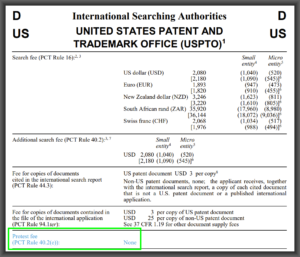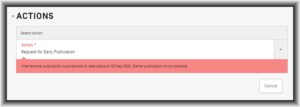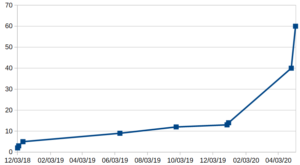See this link on the WIPO web site for information on upcoming PCT Seminars. These are free of charge.
The USPTO does the right thing about ePCT
Dear readers, I am delighted to be able to report that the USPTO did the right thing this past week about ePCT. The executive summary of it is that the USPTO had published a Federal Register notice on May 6, 2016 that put a cloud over the use by US applicants of ePCT. The cloud related to USPTO’s interpretation of 37 CFR § 5.15 which has to do with foreign filing licenses. In a Federal Register notice on September 30, 2020, the USPTO promulgated a change to 37 CFR § 5.15 which removes the perceived problem relating to foreign filing licenses. The thing that I am delighted to be able to report is that the USPTO has expressly stated that the warning in the May 6, 2016 Federal Register notice no longer applies. Applicants that were apprehensive about using ePCT during the past four years can now set aside that apprehension. (There are still things about foreign filing licenses that applicants need to be careful about, as I will discuss.)
This good thing that the USPTO did on September 30, 2020 happened because twenty-one patent practitioners asked it to do so.
That’s the executive summary. Here are the details.
Continue reading “The USPTO does the right thing about ePCT”
Further responsiveness by a patent office
(Updated October 16, 2020 to reflect that the IB has now updated Annex D for Finland, noting that ISA/FI does not charge a protest fee. Now only Spain’s searching authority remains outstanding in this effort.)
A patent office that was responsive recently to a practitioner’s frustration has now been even more responsive. How is that for a bit of good news? Continue reading “Further responsiveness by a patent office”
An example of Patent Office responsiveness

Here is an example of a patent office being remarkably responsive to a user concern.
Continue reading “An example of Patent Office responsiveness”
What is the protest fee in ISA/US?
 In the PCT listserv, a practitioner recently exasperatedly asked:
In the PCT listserv, a practitioner recently exasperatedly asked:
What is the protest fee in the International Searching Authority at the USPTO?
The movie Airplane makes clear how such a question should be answered.
Rumack (Leslie Nielson): You’d better tell the Captain we’ve got to land as soon as we can. This woman has to be gotten to a hospital.
Elaine Dickinson (Julie Hagerty): A hospital? What is it?
Rumack: It’s a big building with patients, but that’s not important right now.
So we realize the answer is:
It’s a fee that you pay if you have been invited to pay additional search fees and if you wish to protest the finding of a lack of unity of invention. But that’s not important right now.
Later in the same movie the following exchange occurs:
Elaine Dickinson: You got a letter from headquarters this morning.
Ted Striker: What is it?
Elaine Dickinson: It’s a big building where generals meet, but that’s not important.
Note the particular cleverness that Elaine delivers the straight line in the first exchange, and having learned how to be funny about this, in the second exchange she is the one to deliver the punch line.
Of course there is always the chance, however remote, that the practitioner was really asking something like:
What is the amount of the protest fee in ISA/US?
This turns out to be a very interesting question, and it prompted me to look up and compare the protest fees in each of the twenty-three ISAs. Here is the answer. Continue reading “What is the protest fee in ISA/US?”
Eighth-largest economy in the world opens national phase route from PCT
![]() When I was first in patent practice, the only way to pursue patent protection in Italy from a PCT application was to enter the European regional phase. There simply was no national-only route to Italy from the PCT.
When I was first in patent practice, the only way to pursue patent protection in Italy from a PCT application was to enter the European regional phase. There simply was no national-only route to Italy from the PCT.
And so things have remained for years and years, until July 1, 2020. On July 1, 2020 Italy, the eighth-largest economy in the world when ranked by gross domestic product, opened a national-phase route from PCT.
You can read all about this in the Italian National Chapter Annex in the PCT Applicant’s Guide.
It is interesting to think about fact patterns that might prompt a filer to make use of this filing path. Clearly one fact pattern that might call for this filing path is if the applicant particularly needs protection in Italy, more than in any other country that belongs to the EPO. Instead of spending all of the money that has to be spent for entering the regional phase in EPO, the filer might only need to spend the money for a national-phase entry in Italy.
Another fact pattern conceivably calling for an Italian national-phase entry might be if an applicant is particularly interested in obtaining utility model protection in Italy. Italy has utility model protection as one of its available protection mechanisms, while EPO does not.
Here are some of the most important things to know about Italian national-phase entry from the PCT:
- Italy is a 30-month Office for purposes of national-phase entry.
- You need to provide a translation of the PCT application into Italian as part of the national-phase entry process.
- For purposes of national-phase entry, DO/EO/IT recognizes Restoration of the Right of Priority, but only under the “due care” standard.
I have to imagine that this recent development must be very popular with patent firms in Italy, since it represents an opportunity to earn a professional fee carrying out a task which previously was not possible to carry out. Indeed I clicked around on the Internet and found many a patent firm in Italy that has posted an article on its web site letting readers know that the firm stands ready to attend to such an Italian national-phase filing.
Have you carried out such an Italian national-phase entry from a PCT? Do you plan to do so? If so, what circumstance is prompting such a plan? Please post a comment below.
The “Captain May I?” problem can arise in PCT cases too
In an earlier blog article I wrote about the “Captain May I?” problem. This is the problem that arises if a Hague Agreement filer (the filer of an international design application) designates the US, and if the filer claims priority from a non-US design application, and if the filer relies upon DAS as the way to provide the certified copy of the priority application to the USPTO. In that blog article I described that for two and a half years now, the USPTO has been aware of the fact that Hague filers often use Form DM/1 as a way to provide a priority claim and its DAS access code. USPTO interprets its own 37 CFR § 1.55 in such a way that the electronic copy of the priority application that USPTO retrieves from DAS, using that DAS access code, does not count as a “certified” copy unless the Hague filer also files an Application Data Sheet presenting the priority claim all over again.
It would have been helpful if USPTO had touched up 37 CFR § 1.55 a year ago, or two years ago, or two and a half years ago, to fix the perceived problem in the rule that leads to this otherwise completely unnecessary duplicate presentation of the priority claim. USPTO’s foot-dragging on this has led to an accumulation of two and a half years’ worth of issued US design patents that have a cloud over them if they claim foreign priority and made use of DAS.
Upon a bit of reflection I realize that this “Captain May I?” problem with USPTO’s interpretation of its own 37 CFR § 1.55 can also put a cloud over a US utility patent if it comes from a PCT application. Continue reading “The “Captain May I?” problem can arise in PCT cases too”
Two more Offices join the WIPO DAS system
![]()
 I am delighted to report that two more Offices have announced their participation in the DAS system. These are the Italian Patent and Trademark Office and the Superintendence of Industry and Commerce of Colombia (the Colombian patent and trademark office). Here are details of the Depositing-Office participations:
I am delighted to report that two more Offices have announced their participation in the DAS system. These are the Italian Patent and Trademark Office and the Superintendence of Industry and Commerce of Colombia (the Colombian patent and trademark office). Here are details of the Depositing-Office participations:
| Colombia is a Depositing Office? | Italy is a Depositing Office? | |
| National industrial design applications | yes since August 28, 2020 | yes since October 1, 2020 |
| National patent applications | yes since August 28, 2020 | yes since October 1, 2020 |
| National trademark applications | yes since October 1, 2020 | |
| National utility model applications | yes since August 28, 2020 | yes since October 1, 2020 |
| PCT international applications filed With the office as a PCT receiving office |
yes since August 28, 2020 | yes since October 1, 2020 |
One striking aspect of this is the participation of RO/CO and RO/IT as Depositing Offices. This reminds us that among the IP5, the straggler Receiving Offices are RO/JP, RO/KR, and RO/US.
Note, too, the ever-increasing participation of Offices in DAS with respect to trademarks.
This also offers a reminder that these two Offices offer utility model protection.
Here are details of Colombia’s Accessing-Office participation:
| Colombia is an Accessing Office? | |
| Hague international applications | yes since August 28, 2020 |
| National industrial design applications | yes since August 28, 2020 |
| National patent applications | yes since August 28, 2020 |
| National trademark applications | yes since August 28, 2020 |
Who is the most trendy, modern and up-to-date Colombian intellectual property firm? Be the first to provide to me an application number, filing date, and DAS access code for a design application, a patent application, a utility model application, and an RO/CO application, and I will recognize your status as the most trendy, modern and up-to-date in Colombia. (I will blur part of the application number in the Certificates of Availability that I obtain and post.)
Who is the most trendy, modern and up-to-date Italian intellectual property firm? Be the first to provide to me an application number, filing date, and DAS access code for a design application, a patent application, a trademark application, a utility model application, and an RO/IT application, and I will recognize your status as the most trendy, modern and up-to-date in Italy. (I will blur part of the application number in the Certificates of Availability that I obtain and post.)
Requesting early PCT publication

The normal timetable for publication of a PCT application is about 18 months after the priority date. But you can request that it be published early. What does this cost? How does one decide whether or not to make such a request? Continue reading “Requesting early PCT publication”
How many 371 cases have been filed thus far in Patentcenter?

US national phase entries in Patentcenter are assigned from a block of application numbers starting at 15/733,001. Our firm was the third ever to file a 371 case in Patentcenter, receiving application number 15/733,003.
By the end of 2019, there had been fifteen 371 cases filed. My firm had filed seven of those cases. Yes my firm had done about half of all of the US national-phase work in Patentcenter from the beginnings of alpha test until the end of 2019.
By now, with Patentcenter opening up for general use, there has been an uptick in national-phase filings in Patentcenter. Twenty of them have been filed just in the past eight days.
